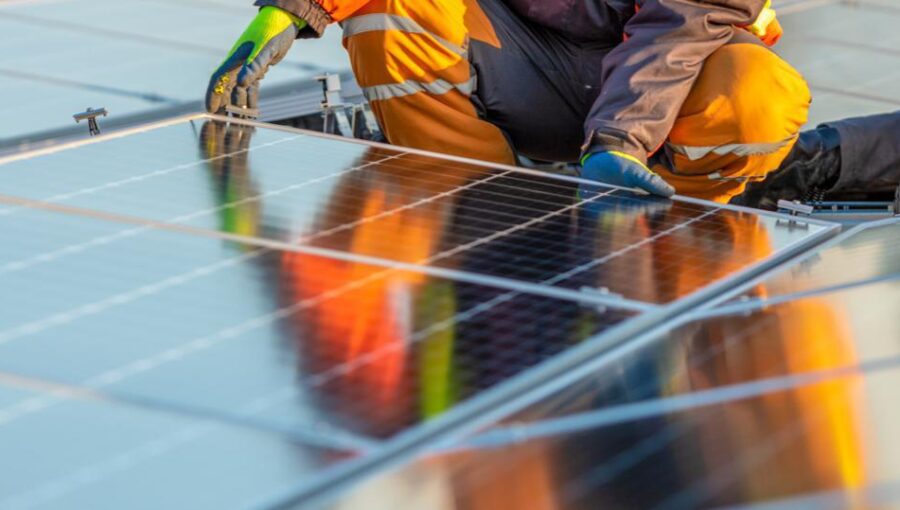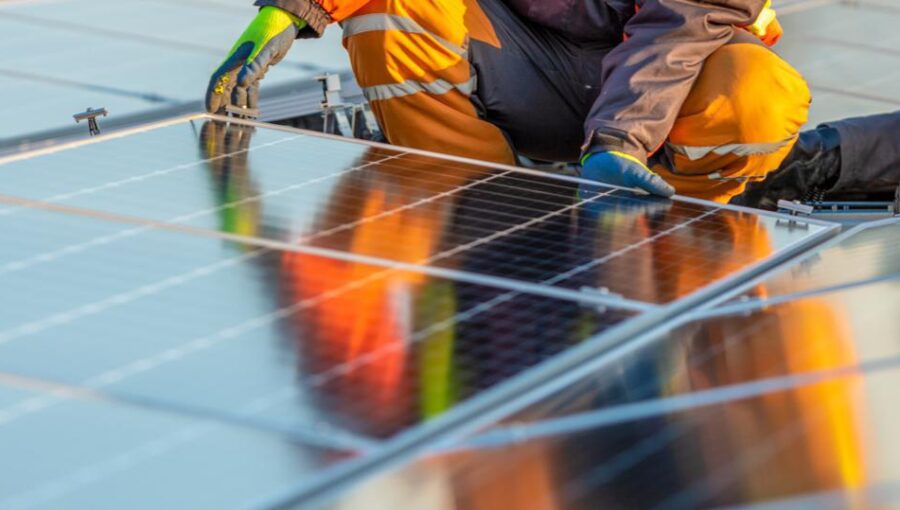The EU needs renewables to curb Russian fossil fuel dependence. For these, it's dependent on China
Russia's invasion of Ukraine has exposed the European Union's dependence on Russian fossil fuels and accelerated the bloc's transition into renewables.
But while no country has a monopoly on the sun and wind, the EU is highly dependent on China for the technology to capture their power.
More than 80% of the world's supply of photovoltaic modules produced yearly since 2010 have been manufactured in Asia. China alone supplied 67% of the module production in 2020, according to the Fraunhofer Institute for Solar Energy Systems.
In fact, eight of the world's 10 biggest solar panel companies and manufacturers are now Chinese with Canadian Solar and the US company First Solar occupying the eighth and 10th places respectively.
In wind, European companies still have an edge with Denmark's Vestas and the Spanish-German Siemens Gamesa on the podium's two top rungs while Germany's Nordex ranks as the eighth biggest manufacturer worldwide.
But China is also quickly gaining ground with six of its companies included in the top ten.
'We cannot afford to be dependent on China'
Beijing's control over the renewable sector is now felt throughout the entire supply chain. About 80% of the components needed to manufacture a wind turbine are produced in China as are 97% of the silicon wafers necessary to build a solar panel.
Forty-five percent of the world's production of polysilicon, a key raw material in the solar photovoltaic supply chain, is produced in Xinjiang, the region in north-west China where the Chinese regime is accused by the US government of carrying out a genocide against the Uighur Muslim minority.
China is also a key player in other raw materials including rare earth minerals that go into renewable technologies. More than 70% of the lithium-ion batteries that entered the market last year were produced in China.
"As the geopolitical environment is changing, these dependencies now are creating real risks," Dr Janka Oertel, director of the Asia programme and senior policy fellow at European Council for Foreign Relations (ECFR), told Euronews.
"We cannot afford to be dependent on China in the most kind of viable industries and the most viable networks like telecommunications and our energy infrastructure that is increasingly in the future going to be incredibly connected and very much digitalised, very much driven by kind of software where risk is just higher," she added.
'Malicious behaviour' from China
But the EU has so far tended to avoid any major trade tussle with China.
Back in 2012, the European Commission, following a petition by European solar manufacturers, launched an anti-dumping and anti-subsidy investigation on Chinese solar panels, which were starting to inundate the European market at a significant discount compared to the locally-produced equivalent.
China retaliated by launching its own anti-dumping and anti-subsidy probe into EU wine imports and signalled a similar investigation into luxury cars could follow and a settlement was reached in 2013 establishing a minimum price for Chinese products. European professionals branded the deal a "capitulation" from EU authorities and a failure to protect their own industry.
There have since been quite a few "cases of what we can call political blackmail," said Maria Pastukhova, senior policy advisor at the Berlin-based climate think tank E3G, with China leveraging its economic clout to pressure other countries.
She cited Beijing's decision in 2010 to ban all rare earth exports to Japan over a fishing trawler dispute or its more recent refusal to clear customs for Lithuanian products after the EU member state allowed the opening of a de-facto Taiwanese embassy. Chinese state-sponsored hackers are also suspected of having carried out cyberattacks against the Indian power grid over skirmishes at a border area disputed by the two countries.
"So there has been some malicious behaviour from the side of China that has been linked to political conflicts with countries," Pastukhova emphasised.
Subsidies and economies of scale
Europe is a significant consumer of renewable technology.
Over a fifth of the total cumulative global photovoltaic installations were carried out on the continent in 2020 and this could accelerate sharply as the EU aims to become the first carbon-neutral continent by 2050.
To achieve this, the bloc plans to cut its greenhouse gas emissions by at least 55% compared to 1990s levels by the end of this decade and boost the share of renewables in the power generation to at least 40%. This will require the installation of wind and solar energy capacity to triple in the coming seven years.
This is likely to mean a lot of Chinese-produced renewable technology. Over the past few months, two large European wind farms — in Italy's Taranto and Croatia's Senj — were powered by Chinese turbines.
The main issue remains price which gives Chinese companies a huge advantage internationally.
For Pastukhova, the challenge is twofold. The first one is the economy of scale i.e. that Chinese authorities have more or less cut off access to their market to foreign companies, giving renewable contracts to homegrown businesses which have therefore grown much more quickly.
The other challenge is production costs. "European companies obviously are producing at much higher cost because we are talking about higher environmental standards, higher labour standards, higher wages," she added.
- Ukraine war: Fossil fuel ‘gold rush’ could make global warming irreversible
- Five things to know about the EU's big plan to become independent from Russian fossil fuels
'Europe still has a cutting edge'
However, when it comes to actual technology, Europe is still leading the way.
"There are still very innovative developments in the US, in Japan and in Europe, particularly when it comes to flexible panels, when it comes to the high-end scale of solar power production efficiency," Pastukhova stressed.
The prognosis is the same for wind where "Europe still has a cutting edge", according to Luke Patey, senior researcher in foreign policy and diplomacy at the Danish Institute for International Studies.
One way to measure innovation is through patent production, he explained. China produces over a third of patents in wind technology — the highest number by far — with the US and Germany producing about 10% each. Yet, when looking at world-class patents, the kind that really pushes the technology forward, Germany submits about half of them while only about 2% of all the Chinese patents are considered as such.
Additionally, manufacturing is just one part of renewable energy projects, servicing and operational maintenance of wind turbine farms, are another important component.
"The Chinese to date have been focussing on getting the price down of the products and not efficiently managing a wind farm over several decades. They need to gain experience in that. And that's going to keep developers from wanting to engage with the Chinese because they don't have the same experience in managing projects," Patey also said.
Friend-shoring, tariffs and access to global markets
Still, time is of the essence to fight against climate change and global warming and to protect European renewable technology companies. Yet time is precisely what the EU will need to mitigate its exposure to China.
Adopting a Chinese strategy of giving local companies preferential treatment for local projects is not much of an option, according to Oertel because "this is not in the European DNA. This is not how we operate and this is not the legal framework that we have."
But one way would be tariffs based on specific environmental and labour standards to ensure the panels and turbines that power Europe are not built off the back of forced labour or practices damaging to the environment, experts told Euronews. These could also target products made cheaply largely thanks to state subsidies which distort competition.
The EU is also increasingly looking at "friend-shoring" key supply chains, including energy.
Commission President Ursula von der Leyen, for instance, addressed the International Solar Alliance when she visited India in April. New Delhi is currently trying to position itself as an alternative to China and ramping up renewable production.
Peer-to-peer partnerships with developing countries that have raw materials and want to expand their manufacturing industries should also be one of the tools used by the EU, Pastukhova said.
This would allow for more manufacturing hubs worldwide and cheaper prices while still allowing these developing countries to spur their domestic industrial growth and ultimately buy more renewable technologies themselves. It is also something that China already does itself with manufacturing centres in Malaysia and Indonesia, among others.
- Which European country is leading on renewable energy?
- EU considers jumping to a 45% renewable energy target by 2030
But European manufacturing should also be protected, Patey highlighted, deploring "growing numbers of closures in (wind turbine) factories in Europe."
"The EU can go on the offence and support companies as they try to sell to the international markets and doing what, you know, China does to a certain extent by offering countries in third markets low finance or low-interest loans so that investors in Siemens Gamesa and other (European) wind companies can kind of expand their reach globally and compete with China at the same level," he argued.
The 27-country Union must make hard choices now because these won't have an impact right away but rather in a couple or five years' time, Oertel said.
And these decisions must be clearly communicated to the 450 million inhabitants in the bloc who are now sensitised to the issue of energy dependency due to Russia's invasion of Ukraine so they know the risks and what could be coming.
"I think that's doable. But it takes honesty by policymakers to acknowledge that other dependencies exist and that not all is fine as long as we get out of Russian oil and gas," Oertel said.

